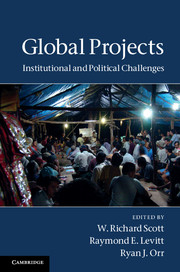Book contents
- Frontmatter
- Contents
- List of figures
- List of tables
- List of contributors
- Preface
- Introduction: studying global projects
- Part I Foundational themes
- Part II Institutional differences and global projects: empirical studies
- 4 Rules versus results: sources and resolution of institutional conflicts on Indian metro railway projects
- 5 Institutional exceptions on global projects: a process model
- 6 Local embeddedness of firms and strategies for dealing with uncertainty in global projects
- 7 Who needs to know what? Institutional knowledge and global projects
- Part III Political conflicts and global projects
- Part IV Governance strategies and structures
- References
- Index
5 - Institutional exceptions on global projects: a process model
Published online by Cambridge University Press: 05 June 2012
- Frontmatter
- Contents
- List of figures
- List of tables
- List of contributors
- Preface
- Introduction: studying global projects
- Part I Foundational themes
- Part II Institutional differences and global projects: empirical studies
- 4 Rules versus results: sources and resolution of institutional conflicts on Indian metro railway projects
- 5 Institutional exceptions on global projects: a process model
- 6 Local embeddedness of firms and strategies for dealing with uncertainty in global projects
- 7 Who needs to know what? Institutional knowledge and global projects
- Part III Political conflicts and global projects
- Part IV Governance strategies and structures
- References
- Index
Summary
When you hear hoof beats think Horses, not Zebras – unless you're in Africa.
There is an ever-growing body of scholarly research to assess and categorize differences in cross-national cultural values (e.g., Hofstede 1984; House et al. 2004) and social institutions (e.g., Hall and Soskice 2001; Busenitz, Gomez, and Spencer 2000) as they affect business practice and economic performance. Within this corpus of research, terms like liabilities of foreignness (Hymer 1976; Zaheer 1995), psychic distance (Johansson and Vahlne 1977), cultural distance (Kogut and Singh 1988), institutional distance (Xu and Shenkar 2002), and institutional idiosyncrasies (Henisz 2003) have become increasingly common. Although there is considerable variation in terms and rubrics, these studies typically draw out a general hypothesis that differences between cultures and social structures impede the success of cross-societal collaborative ventures. In the words of Javidan and House (2002), “From a practical point of view, the complexity of cross-national negotiations, mergers, assignments and leadership probably depends on the extent of the difference between the two cultures.” Despite widespread support for this premise, there has been relatively little empirical effort to examine the underlying processes – the actual dynamics and conditions – by which cross-societal variations in rules, norms, and cultural beliefs are translated into the kinds of complications and costs that have been documented by mainstream researchers (Shenkar 2001).
To enhance understanding of how cross-societal friction actually arises, we analyzed a set of 23 case studies collected from cross-border contractors and investors, such as Bechtel, Walt Disney, and the World Bank, involved in large-scale global projects.
- Type
- Chapter
- Information
- Global ProjectsInstitutional and Political Challenges, pp. 135 - 182Publisher: Cambridge University PressPrint publication year: 2011
- 4
- Cited by



